Cuba-linked Twitter activity trends in Venezuela
In the wake of COVID-19, Cuba-linked
Cuba-linked Twitter activity trends in Venezuela
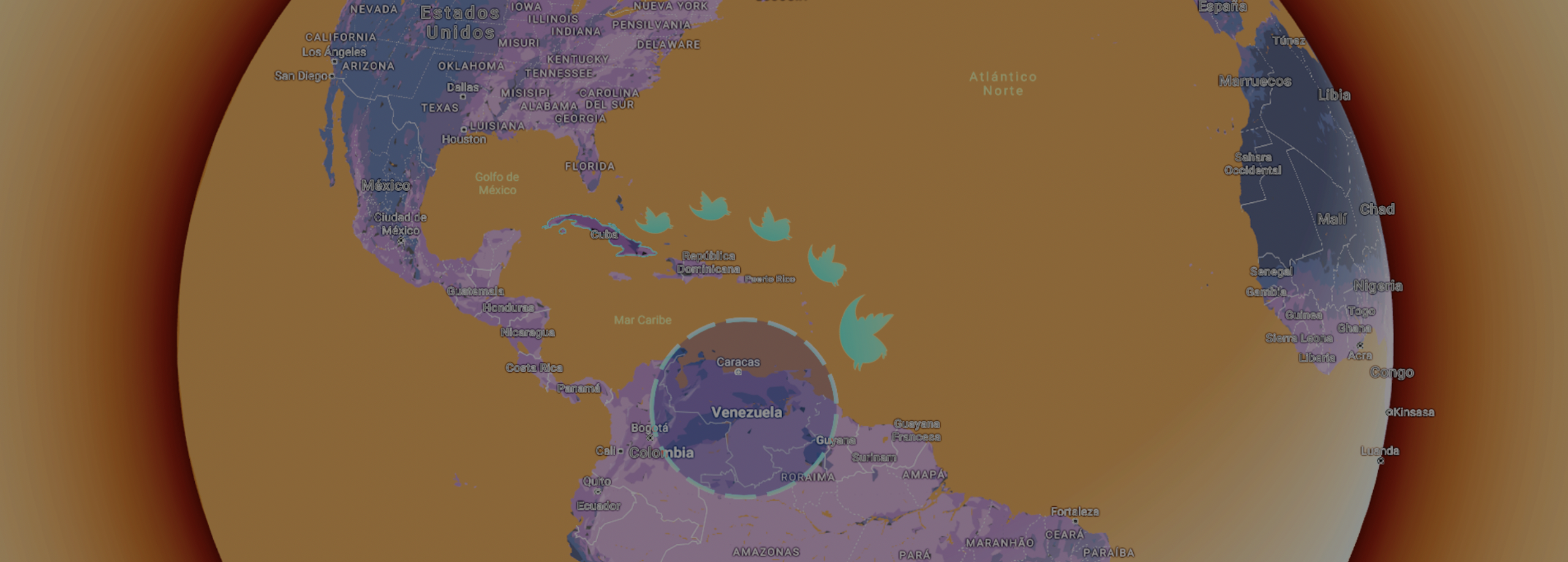
In the wake of COVID-19, Cuba-linked accounts promoted hashtags denouncing U.S. sanctions and promoting Cuban medical missions in Venezuela
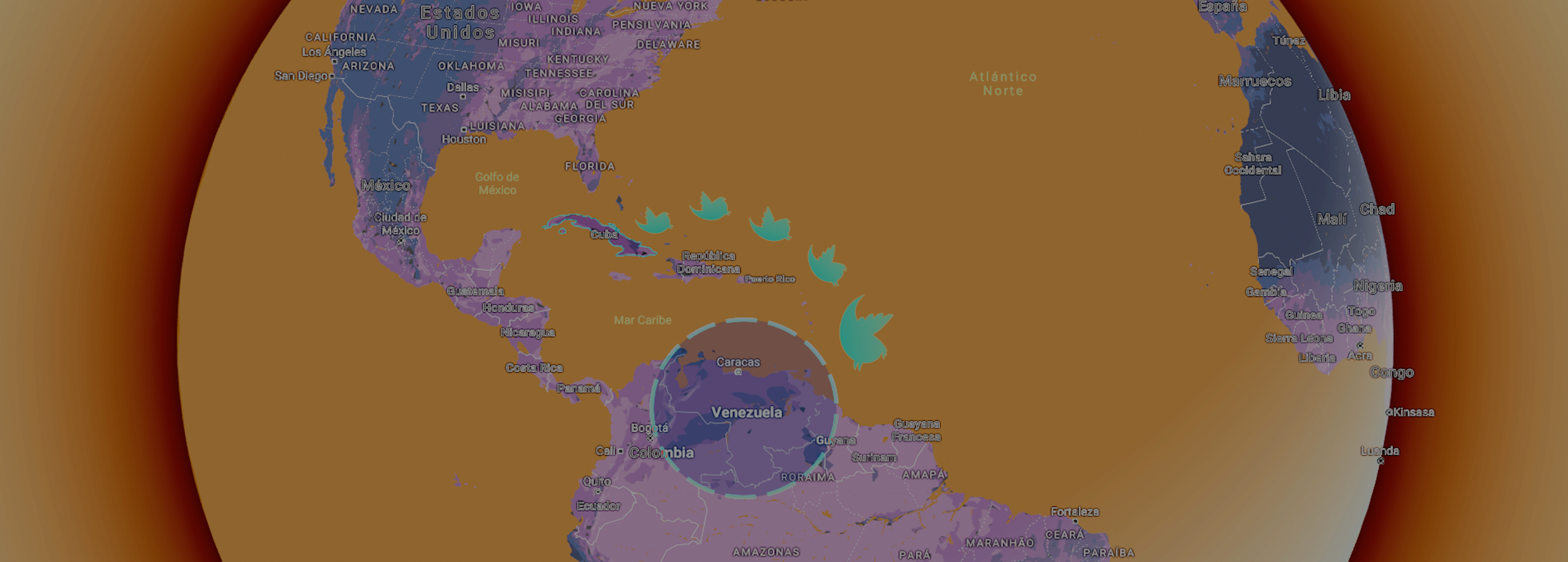
Cuban accounts connected to the regime participated in an effort, along with Venezuela-linked accounts, to make at least six anti-U.S. sanctions and pro-Cuba hashtags trend on Twitter in Venezuela. An analysis showed that a small group of accounts generated more than half the volume of mentions per hashtag, in a likely attempt at platform manipulation.
Venezuela has a well-documented tradition of online platform manipulation. The Maduro regime offers institutionalized incentives and support to encourage coordinated hashtag manipulation on Twitter, and there is evidence that Venezuelan accounts have meddled in the domestic politics of other countries via attempts at online manipulation.
In contrast, there is little known about the extent, scope, and tactics of Cuban state-backed platform manipulation, although a report from the Oxford Internet Institute classified the Cuban regime as possessing a “medium cyber troop capacity.” The Cuban information space remained relatively closed off until fairly recently, with Cuban President Miguel Diaz-Canel opening his Twitter account in October 2018. Access to the internet has increased since 3G networks were introduced in the country in late 2018; still, the majority of the population does not have access to social media.
But Cuba and Venezuela are close strategic partners, and the Cuban government has, to an extent, acted as a mentor and model for the Venezuelan government since the latter adopted socialism in 1999. Both countries have also faced economic sanctions from the United States, which their regimes fault for their respective economic crises. Additionally, both countries share a close economic and military relations with China and Russia respectively. Online, the Cuban and Venezuelan regimes’ political affinity and shared strategic interests has translated into a nascent allyship and mutual amplification among Cuba-linked and Venezuela-linked Twitter accounts.
Cuba-related hashtags have trended in Venezuela before, but they started appearing relatively recently, and with increasing frequency, according to ongoing monitoring by the DFRLab and its partner organization, ProBox. Cuba and Venezuela were already converging on the same narrative about COVID-19: that sanctions imposed by the U.S. were harming each country’s ability to fight the pandemic. Furthermore, hashtags pushed by Cuban accounts in Venezuela condemned sanctions to both countries and promoted Cuban medical missions to Venezuela.
Cuba and Venezuela-based accounts
The DFRLab analyzed six hashtags initially posted by Cuban accounts about discussions either against the U.S. sanctions on both Cuba and Venezuela or supporting the Cuban medical missions to confront the COVID-19 outbreak. Despite having been initiated by Cuban accounts, the hashtags trended in Venezuela between April 2 and May 1, 2020, after Venezuela-based accounts promoted them.
The DFRLab collected data based on specific hours before and after the hashtags reached the trending topics. These timeframes were selected to investigate whether the behavior of accounts posting the hashtags changed after they reached the trending topics, which could indicate a coordinated attempt at manipulation.
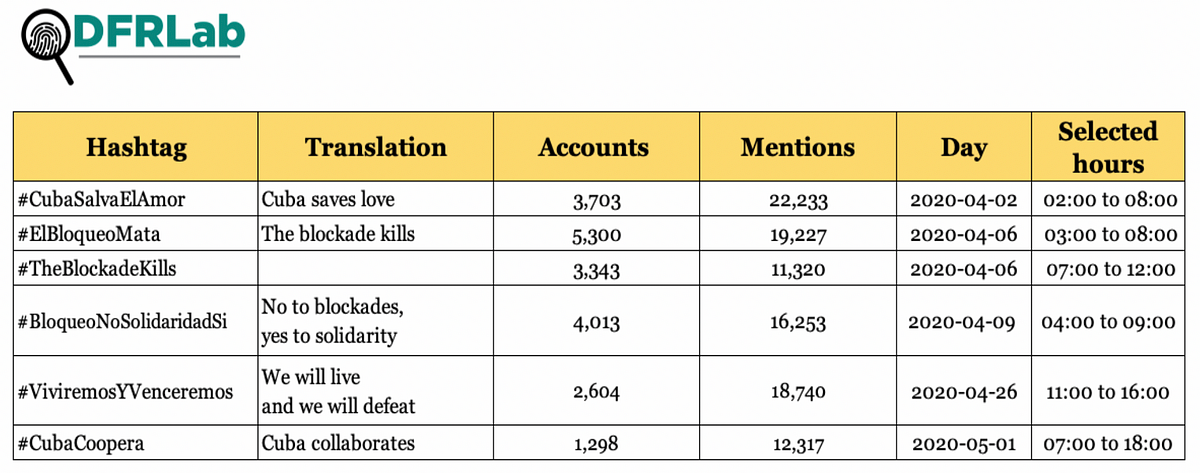
The hashtags #ViviremosYVenceremos (“We Will Live and Overcome”) and #BloqueoNoSolidaridadSí (“Blockade No, Solidarity Yes”) reached the trending topics in Venezuela after Cuban regime officials and pro-regime media outlets evoked the phrases to describe Cuba’s strategy to fight COVID-19. The hashtag #CubaCoopera (“Cuba Cooperates”) refers to a Cuban initiative that provides medical assistance in other countries. Twitter does not provide a list of trending topics in Cuba, so there is no data to determine whether the hashtags also trended in the country.
In addition, Cuban accounts were among those pushing the hashtags to trend. For instance, the Cuban Institute of Friendship with the People (also known by its Spanish acronym ICAP) was the first account to use #TheBlockadeKills, while Maricela Torres Falcón, the account of a Cuba-based journalist, was the first to use #CubaSalvaElAmor.
In total, 13,365 individual Twitter accounts used the six hashtags in the timeframes analyzed. Only 47 percent of these accounts set the location in their Twitter profile. Cuba and Venezuela were the most common locations among accounts engaging with the hashtags. Since Twitter users can define their locations, that does not necessarily mean that these accounts were indeed operated fr0m these countries.
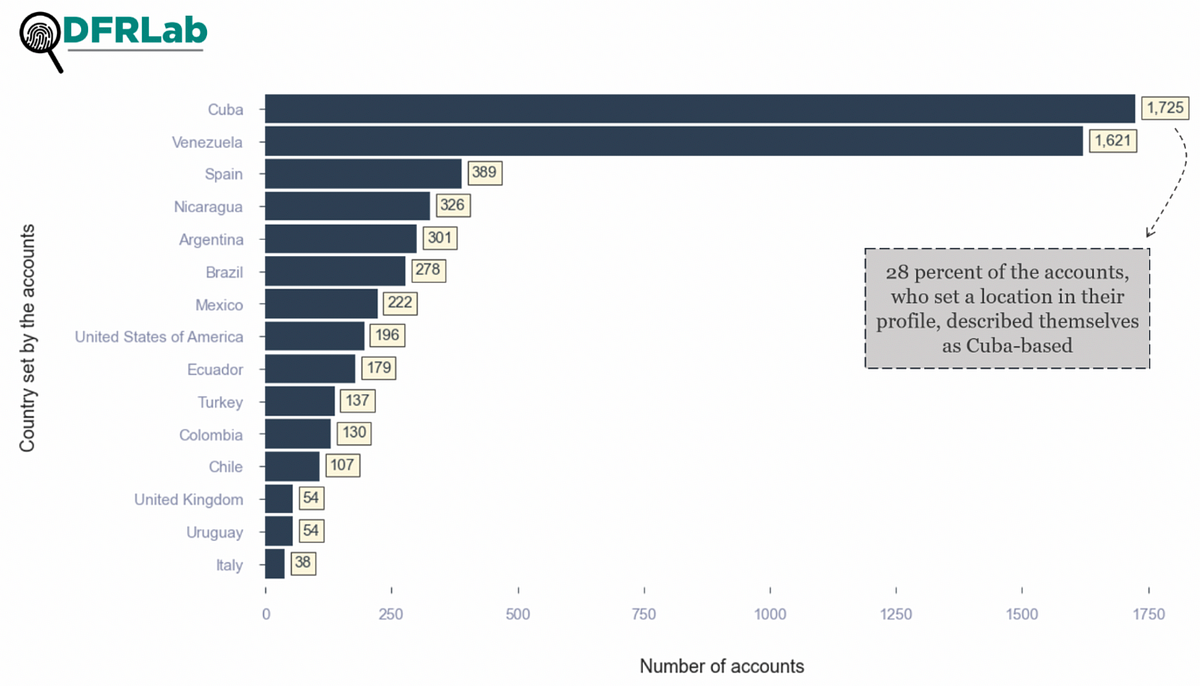
Accounts that set their location to Cuba amassed nearly 22,500 posts, which represents about 25 percent of all mentions. These accounts described themselves as supporters of the Cuban regime and belonging to Cuban government ministries, such as the Ministry of Public Health.
The second most popular user-defined location among the accounts tweeting the hashtags was Venezuela, which explains how hashtags started by Cuban accounts ended up as trending topics in Venezuela. The DFRLab found that 26 percent of the accounts that set a location in their profile identified themselves as Venezuela-based. In total, the activity of this group amassed nearly 9,000 posts mentioning the hashtags, which represents around 10 percent of all mentions.
Signs of traffic manipulation
To explore the Twitter traffic flow in these six hashtags, the DFRLab used the CTM (Coefficient of Traffic Manipulation) method, first published by the Oxford Internet Institute’s Computational Propaganda Project. This measure allows researchers to assess potential traffic manipulation on Twitter by considering three indicators: the average number of tweets per user, the percentage of retweets, and the percentage of traffic generated by the most active 50 accounts. This measure, however, is only a relative indicator of manipulation, not a definitive one, and should be taken into account alongside other indicators.
The CTM assigns to each Twitter traffic flow a score based on the three indicators mentioned above. In earlier studies, organic, non-manipulated traffic flows scored a CTM of 12 or lower. All six of the analyzed hashtags in this case scored above 30. The hashtag #CubaCoopera scored the highest, at a CTM of 62.9. The 50 most active accounts that promoted this hashtag during the selected hours amassed 46 percent of all mentions, indicating that a small group of users generated a large proportion of the Twitter traffic for the hashtag.

The proportion of traffic generated by the 50 most active accounts may not be an appropriate indicator of manipulation when comparing traffic flows substantially different in size. To address this concern the DFRLab also calculated CTM scores for the hashtags based on the top 10 percent of most active accounts.
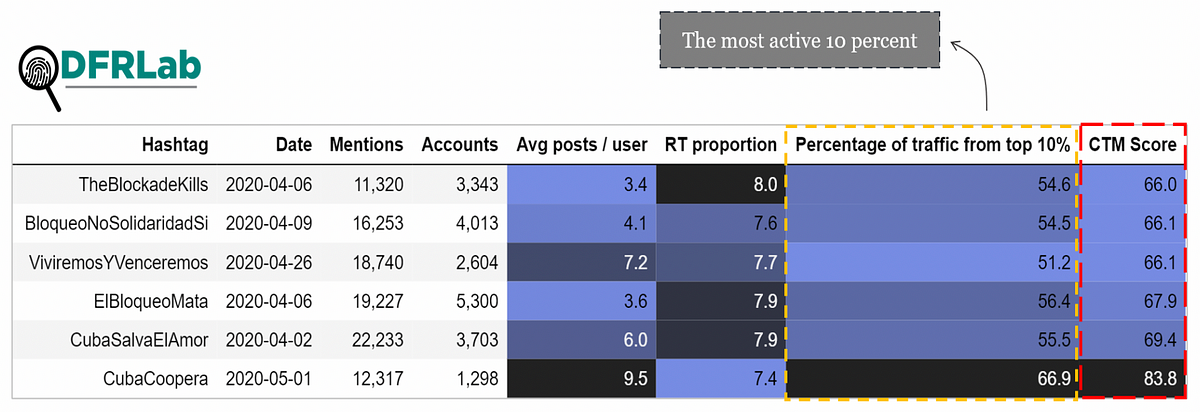
The most active 10 percent of the accounts amassed more than 50 percent of the mentions across all of the six hashtags. This analysis indicates that these hashtags trended because of a coordinated attempt at manipulation by a small cohort of accounts.
The DFRLab measured the CTM per hour of the highest scoring of the hashtags, #CubaCoopera. Between 11 a.m. and 12 p.m. the hashtag reached its peak of mentions, as well as its highest CTM score. This is yet another indicator that the effort was coordinated, as the per-hour CTM score for the hashtag fell once the accounts reached their objective — catapulting the hashtag into the trending topics.
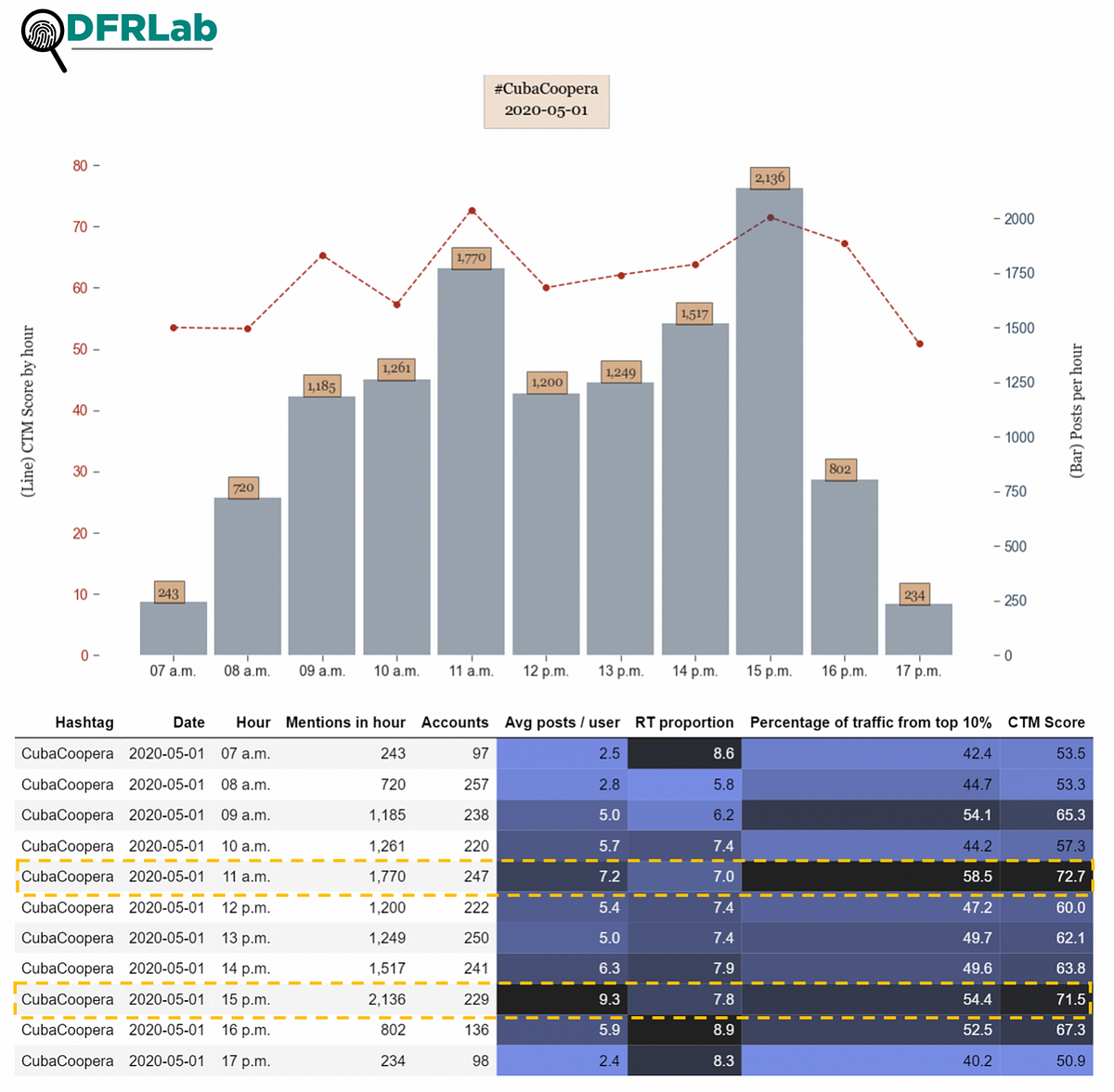
The most active accounts
Among the most active accounts using the six hashtags were Cuban accounts which belonged to Cuban embassies around the world, Cuban organizations located in Cuba, and Cuban healthcare organizations or medical personnel connected to the Cuban medical missions located in Venezuela. Among the Cuban accounts supposedly based in Venezuela were @CubaCooperaveTR and @OsmanyElias, which appeared in mentions of the six hashtag 297 and 288 times, respectively. @CubaCooperaveTR, the Cuban delegation of the Venezuelan state of Trujillo, repeatedly tweeted at least one of the six hashtags, as did 42 other accounts incorporating the phrase “CubaCoopera” within their Twitter handles.
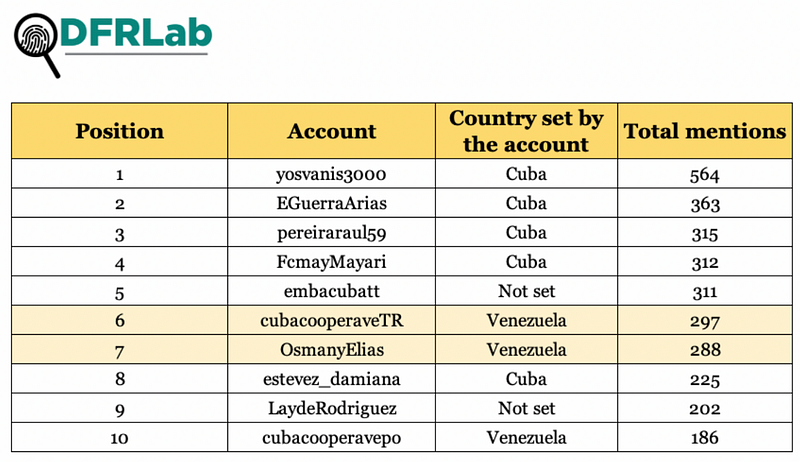
@OsmanyElias, a self-described Cuban doctor based in Venezuela, also appeared as one of the accounts with more interactions using the hashtags #ElBloqueoMata, #TheBlockadeKills, and #BloqueoNoSolidaridadSí.
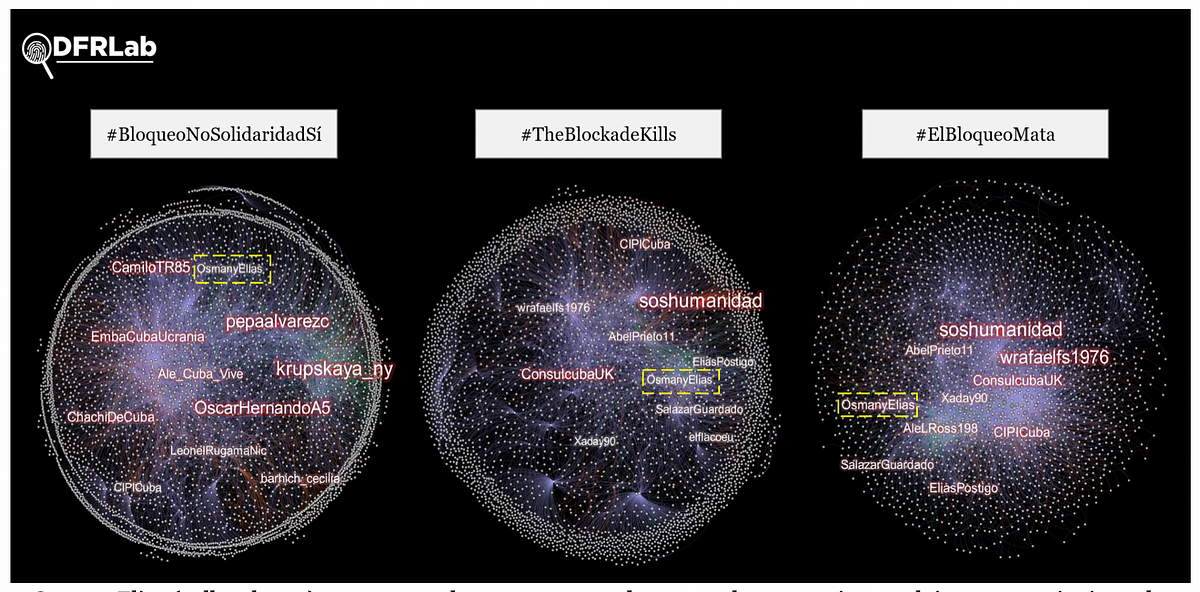
Three accounts — @OsmanyElias and two other accounts referencing “CubaCoopera” in their account handles — were suspended for violating Twitter rules during the course of this analysis. One of these accounts, @CubaCooperaVe, was the official account of the Cuban medical mission in Venezuela. The Cuban organization rejoined Twitter under a different handle on May 21, 2020.
The Maduro regime has a well-documented apparatus in place for state-backed online platform manipulation, both targeting domestic and foreign audiences. In contrast, the Cuban government has been more restrained in this respect, in part because the country’s domestic population has limited access to internet.
The Cuban and Venezuelan regimes are natural allies, however, and their interests have converged around COVID-19. A month after both countries registered their first COVID-19 cases, Cuban state-linked accounts lashed out against the U.S. government on Twitter, claiming that U.S. policy toward both countries, including economic sanctions, was at the root of their respective economic crises. In tandem with these statements, pro-Cuba accounts — some of them with locations set to Cuba, and others set to Venezuela — attempted to manipulate Twitter traffic to catapult certain pro-Cuba hashtags to the trending topics in Venezuela.
Esteban Ponce de León is a Research Assistant, Latin America, with the Digital Forensic Research Lab.
Daniel Suárez Pérez is a Research Assistant, Latin America, with the Digital Forensic Research Lab.
This research was conducted in partnership with Probox, a Venezuelan nonprofit organization “combating digital disinformation and creating consciousness through education and innovation.”
Follow along for more in-depth analysis from our #DigitalSherlocks.

